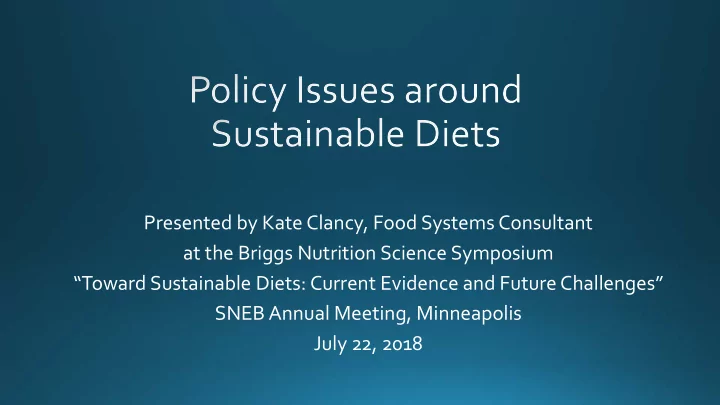

Presented by Kate Clancy, Food Systems Consultant at the Briggs Nutrition Science Symposium “Toward Sustainable Diets: Current Evidence and Future Challenges” SNEB Annual Meeting, Minneapolis July 22, 2018
Source: FAO and Biodiversity International, 2012. In Mason, P., and Lang, T. 2017 . Sustainable Diets. Routledge/earthscan. London and New York.
• Food crises across the world demonstrate that food systems issues cross all scales and sectors. • Food policy is a field for which there is a clear need for better integrated policies across sectors. • This integration is quite challenging – but critical to global stability and food security. Source: Candel and Pereira. 2017. Towards integrated food policy. Env. Sci.and Pol.
• Diversity – a wide variety of foods • Balance between energy intakes and energy needs • Based on minimally processed tubers and whole grain, legumes, and fruits and vegetables; meat in moderate quantities • Dairy products in moderation • Unsalted seeds and nuts • Small quantities of fish sourced from certified fisheries Source: Fischer, C.G., and Garnett, T. 2016. Plates, pyramids, planet. Food and Agriculture Organization of the United Nations and The Food Climate Research Network at the University of Oxford.
Source: Lang, T. 2015. Sustainable diets: another hurdle or a better food future? Development 57(2): 240–256.
Professional 1. We cannot get to sustainability without understanding the environmental, social, and economic affects of production and consumption. 2. We have intellectual fragmentation when interdisciplinary, systems perspectives are needed.
Commercial 1. Industry leaders don’t want any food disparaged 2. Sustainability moves discussion from food groups to individual foods 3. Sustainability discussion has potential to forge new political coalitions 4. If DGAs address sustainability, will elevate discussion of sustainable diets, and could lead consumers to purchase “greener” foods Source: Merrigan, K., Griffin, T., Wilde, P., Robien, K., Goldberg, J., and Dietz, W. 2015. Designing a sustainable diet. Science 350 (6257): 165–166.
Political 1. Lack of leadership in U.S. 2. Assaults on science 3. Consumer choice culture-”this is folly” 4. Multiple interventions and instruments required 5. Lack of policy coherence between government and industry
• Educate nutritionists about sustainability and systems thinking • Revive the long-time elements of nutrition science (life sciences, social sciences, and ecology) • Provide a rational policy framework to guide producers and consumers to sustainability • Study sustainable diets efforts in other countries • Work at national, regional, and local levels to increase discussion and action re: sustainable diets
Recommend
More recommend